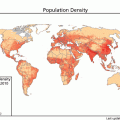Classification: ICD-9 084.3; ICD-10 B53.0
Synonyms: malaria, paludism, tropical fever.
Agent: Plasmodium ovale, an intacellular protozoan parasite in the Phylum Apicomplexa. Phylogenetically, P. ovale clusters with other Plasmodium species affecting simian primates.
Reservoir: Humans and possibly other primates (chimpanzees). Evidence of naturally occurring P. ovale in chimpanzees has been reported.
Vector: Female mosquito of the genus Anopheles (see Anopheles map).
Transmission: By mosquito bite (Anopheles spp.).
Cycle: Infective sporozoites are inoculated by the bite of anopheles mosquitoes and through the bloodstream and lymphatics reach the liver where they differentiate into tissue schizonts that release merozoites, or to a dormant stage (hypnozoite) that can become active after months or years, causing relapse. Merozoites released from liver infect erythrocytes that develop to schizonts, rupture and release merozoites that will infect new erythrocytes (this cycle takes 48 hours). Some merozoites develop into gametocytes that are able to infect mosquitoes during a blood meal.
Stay updated, free articles. Join our Telegram channel

Full access? Get Clinical Tree




